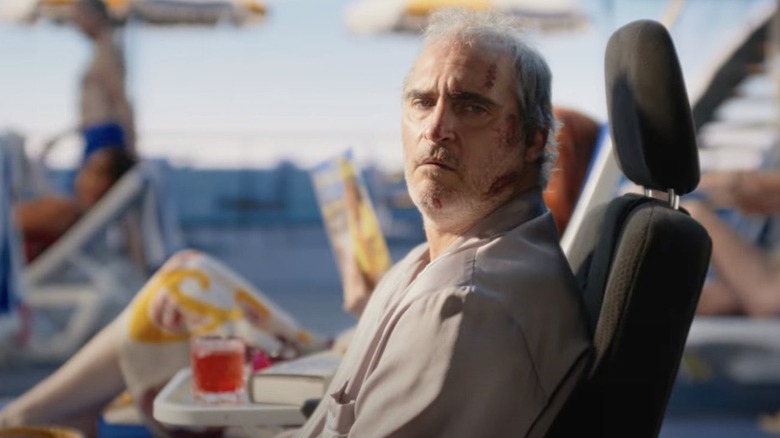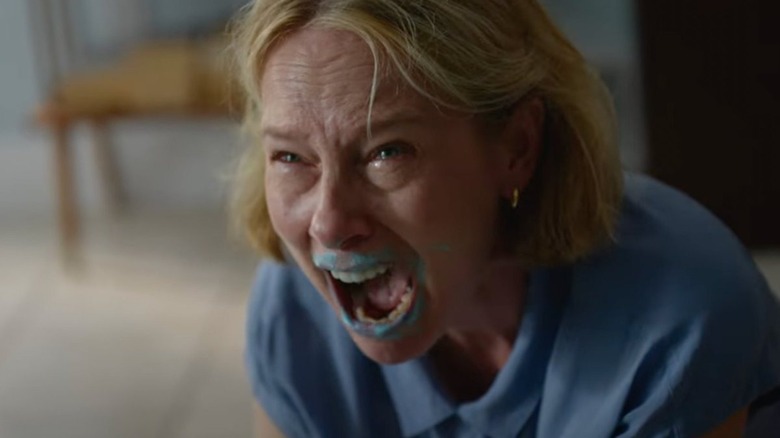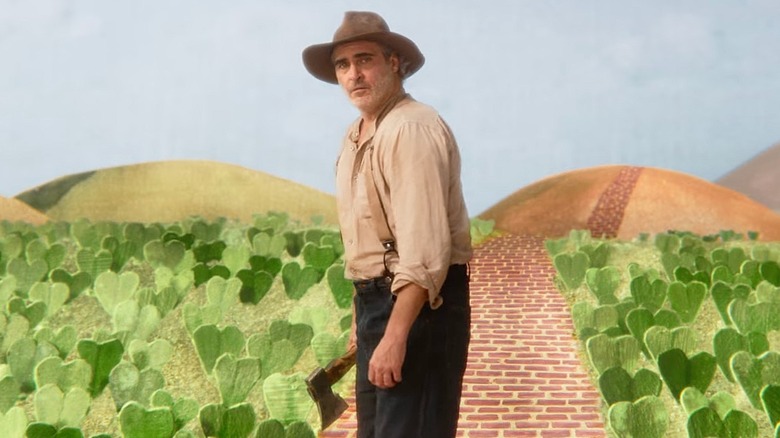Joaquin Phoenix Pushed For Even More Chaos In Beau Is Afraid
This article contains mild spoilers for "Beau is Afraid."
Ari Aster's new film "Beau is Afraid" is an elongated, abstract college-student-experimental-art-piece-cum-Oedipal-freakout that will leave most audiences either confused or outright enraged. Running three hours, the film takes place in an abstract, non-real world where guilt, fear, and panic seem to be humanity's only available emotional states. Joaquin Phoenix plays the titular Beau who, at the film's start, lives in a rundown apartment in the middle of a war zone. He has to sprint down the street and make his way quickly through his building's security door before a pursuing tattooed, black-eyed man can attack him. There is a dead body rotting in the middle of his intersection, and no one seems the least bit concerned with removing it.
When Beau requires a bottle of water to take with his medication, he finds that his apartment keys have been stolen. Propping his apartment door open with a phone book, he sprints across the street to a convenience store. People scream at him. A naked man commits a stabbing in the background. Gunshots fire. Naturally, the propped-open door invites in dozens of criminals and vandals who instantly infiltrate Beau's building. He has to sleep on construction scaffolding that night, watching home invaders rip his depressing apartment to shreds from outside his own window. The entire city sequence only serves as the introductory act to Aster's film. It only becomes more strange, abstract, and chaotic from there.
In a recent roundtable discussion about "Beau is Afraid," /Film's own Lex Briscuso was able to ask Phoenix and Aster about that sequence, and they both revealed how the chaos and filth were increased and enhanced.
God is in the details
The city sequences, while chaotic and miserable, are bursting with detail. It's like a "Where's Waldo" drawing from Hell, with the audience always scanning the scene to find another character or miniature scene playing itself out in the background while Beau runs through the foreground. One might instantly make note of the dance instructor, the characters waiting in line for food at the community outreach truck, or the police officer hassling the sex worker. And what was the deal with the man who runs up to Beau and merely being pleading "helpmehelpmehelpme?" One might even get the impression that "Beau is Afraid" takes place in a strange, near-apocalyptic near-future where society is that much closer to total collapse.
Aster revealed that every single extra in his film received direction. He wanted to, it seems, construct a complete scene, not just a setting. In Aster's words:
"I just took a lot of time to build it out and think about what all those details could be, who all those people on the street could be. There was no background actor that just was standing there. They all had very, very specific directives."
Despite how mad the world was, Phoenix seemingly wanted more. Talking directly to Aster, Phoenix recalled a moment when he asked for something more stressful than what Aster was already providing. How could this sequence go from a panic attack to a warzone? The actor recalls:
"I remember thinking, in one sequence, 'This isn't enough. We need something else.' But seriously, I was like, 'Isn't there something else? I'm running across the street. There's one other little piece.' And you were like, 'Well, I could have a gun go off.'"
It isn't enough
Phoenix said that no matter how fevered it was, "it still wasn't enough." Aster, however, appreciated the suggestion, saying that the gunshot was a good final addition.
As mentioned, the city sequence only takes up the first portion of "Beau is Afraid." It will eventually find the main character trapped in the home of seemingly kind suburban professionals, only to find their lives are also an example of Earthly decay. Each one of them is marked by panic and mysterious pharmaceuticals that they eat like candy. Later in the film, Beau will be lost in the woods, only to be discovered by a traveling theater troupe who seems to enact a fantastical version of his own story ... and how his life might turn out in the future. Periodically, the film will flashback to a formative moment in Beau's childhood when he first fell in love.
All of this is infused with dark moments of motherly hate, wherein Beau's mom (Zoe Lister-Jones in the past, Patti LuPone in the present) injects his mind with poisonous neuroses. "Beau is Afraid" is absurd and off-putting, and eventually Phoenix, as an actor, just sort of had to roll with it. Eventually, he realized that Beau's understanding of the chaotic world around him was going to be more important than his or the audience's comprehension. "Beau is Afraid" is, ultimately, a psychological study — indeed, it reads like an actual therapy session — than a conventional cinematic story.
It seems that we must open ourselves to the gentle indifference of the world. Only, in "Beau is Afraid," it is not the least bit gentle.


